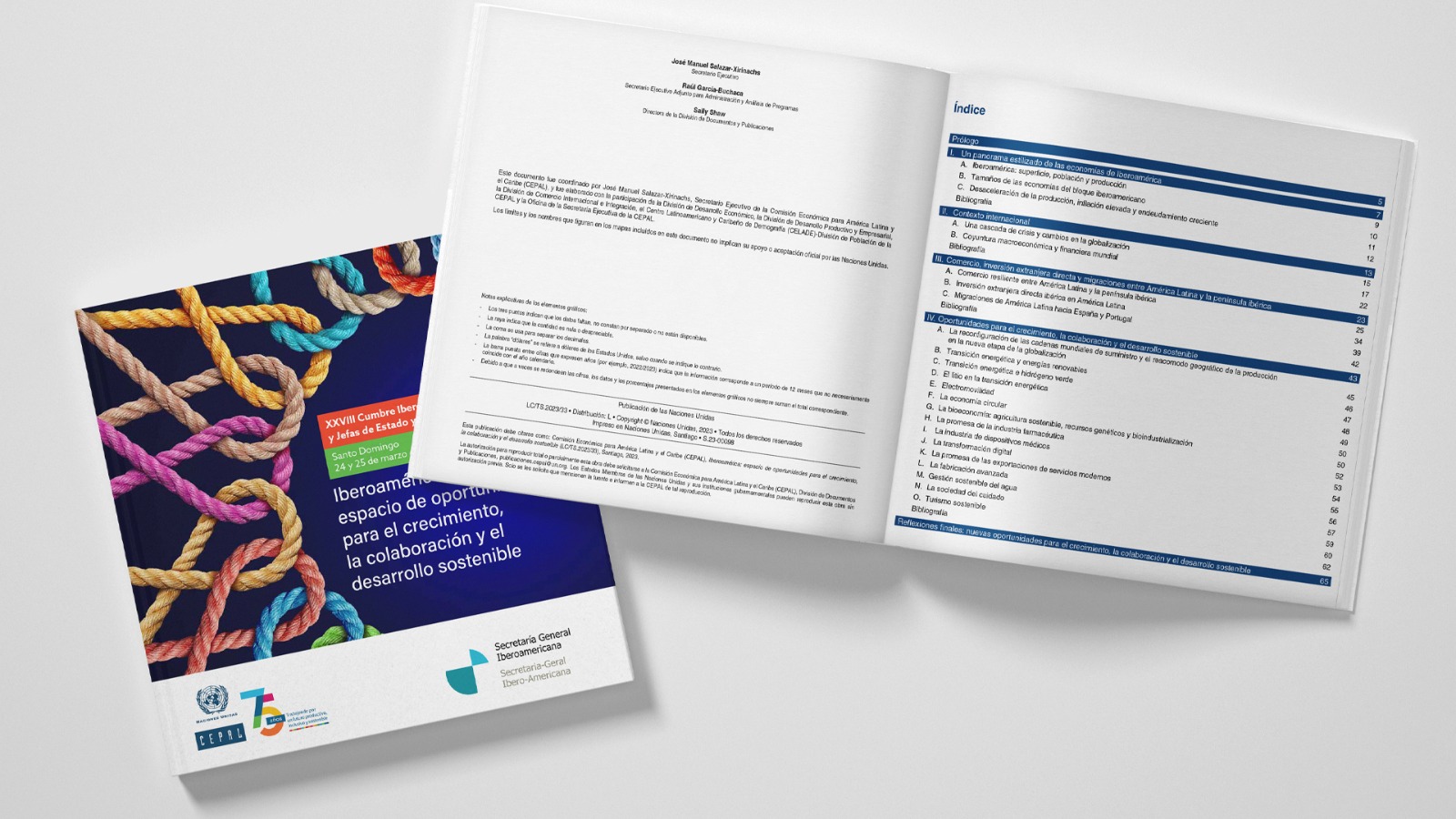ECLAC Presents New Opportunities for Growth, Collaboration and Sustainable Development to Ibero-America’s Heads of State and Government
Work area(s)
The document seeks to contribute to the debates of the XXVIII Ibero-American Summit, which concludes today in Santo Domingo, Dominican Republic.

The Economic Commission for Latin America and the Caribbean (ECLAC) presented a document today to the Heads of State and Government of Ibero-America identifying 15 opportunities that hold great potential for promoting growth, creating employment and improving well-being in the region, through public policies, investment, public-private partnerships and international cooperation.
The document entitled Ibero-America: A space of opportunities for growth, collaboration and sustainable development is a contribution by the United Nations regional commission to the debates of the XXVIII Ibero-American Summit, which is concluding today in Santo Domingo, Dominican Republic and in which ECLAC’s Executive Secretary, José Manuel Salazar-Xirinachs, has been actively participating.
The publication, which is part of efforts to deepen relations between ECLAC and the Ibero-American General Secretariat (SEGIB), reviews economic relations of trade and investment in the Ibero-American space and points to the main challenges facing Ibero-America.
“In this context of tensions and challenges, ECLAC wants to contribute to the dialogue with not only an assessment of gaps and trends, but also the definition of areas of opportunity with great potential for promoting growth, creating employment and improving well-being,” said the Commission’s Executive Secretary, José Manuel Salazar-Xirinachs.
According to ECLAC’s figures, the Ibero-American region takes up 15.3% of the world’s surface and is home to 8.7% of the global population. In 2021, Ibero-American GDP represented 8.6% of global GDP. In 2023, it is forecast that the countries of Ibero-America, with the exception of Paraguay, will experience lower growth than in 2022. Only five of the bloc’s 22 countries will have economic growth rates exceeding 3%.
In light of the highly significant challenges facing the region, the 15 opportunities identified for growth, collaboration and sustainable development proposed by ECLAC are: the reconfiguration of global supply chains, the energy transition and renewable energy, the green hydrogen industry, lithium in the energy transition, electromobility, the circular economy, the bioeconomy, the pharmaceutical industry, the medical device industry, digital transformation, the exportation of modern services, advanced manufacturing, sustainable water management, the care society and sustainable tourism.
“It is essential for countries to harness these opportunities to the greatest extent possible in order to restore investment and growth. To this end, development patterns must be reoriented towards more knowledge-intensive sectors, with higher growth rates for demand and employment and which would foster the diversification of exports,” the publication states.
In the document, ECLAC also highlights the pro-active and dynamic role that States and public policies must play in articulating proposals and in formulating and implementing policies, in terms of both their sectoral and general dimensions.
Furthermore, it calls for creating – or revitalizing – strategic partnerships and collaboration in the Ibero-American space at all levels, and it stresses that the sectors and areas identified as opportunities can also become vectors for strengthening regional integration and multilateralism.
“Ibero-America has an important opportunity to actively participate in designing the new international governance and to defend its interests and aspirations in a context of renewed international cooperation,” ECLAC’s Executive Secretary underscored.
To this end, he added, it is essential to bolster the processes and institutional structure of regional integration substantively and arrive at shared visions on specific issues.
“Crises should be learning opportunities. That is why this document’s analyses and proposals call for action and for international cooperation to overcome limitations, harness opportunities and create spaces for hope. That is the spirit in which ECLAC puts this document at the disposal of Ibero-American countries,” José Manuel Salazar-Xirinachs concluded.
In the framework of his participation in the XXVIII Ibero-American Summit, ECLAC’s highest authority participated on Saturday, March 25 in the XXXIII Meeting of Presidents of Ibero-American Business Organizations OIE-CEIB, where he made a presentation entitled “Opportunities for productive transformation, competitiveness and employment in the region.”
In his remarks, he underlined the urgency of promoting productive development policies in Latin America and the Caribbean and stressed the need for countries to scale these policies with a productivist and structuralist vision, and with modern approaches.
“If this was important before the pandemic, now it is both urgent and imperative,” he declared.
Previously, on Thursday, March 23, ECLAC’s Executive Secretary participated in the Consultative Observers’ Work Meeting of the XXVIII Ibero-American Summit, where he expressed his intention to deepen relations with the Ibero-American General Secretariat and continue putting the regional organization’s intellectual production at the disposal of the Ibero-American community.
That same day, in the framework of the XIV Business Meeting of the Ibero-American Summit 2023, he participated in the presentation of the Latin American Economic Outlook (LEO) report, prepared jointly by ECLAC, the Development Centre of the Organisation for Economic Co-operation and Development (OECD), CAF-Development Bank of Latin America, and the European Commission. There, he emphasized that the green transition and productive development policies are essential elements for an urgent and necessary change in the region’s development model.
The activities of ECLAC’s highest-ranking official at the Ibero-American Summit included a series of bilateral meetings with authorities such as Ulrik Vestergaard Knudsen, Deputy Secretary-General of the OECD; Andrés Allamand, Ibero-American Secretary-General; Pável Isa Contreras, Minister of Economy, Planning and Development of the Dominican Republic; Antón Leis Garcia, Director of the Spanish Agency for International Development Cooperation (AECID); and Alfonso Gómez Palacio, CEO of Telefónica Hispanoamérica, among others.
Related link(s)
-
Document: Ibero-America: A space of opportunities for growth, collaboration and sustainable development (Spanish)
Video: Ibero-America, a space of opportunities for growth, collaboration and sustainable development (Spanish)
Video: Fifteen opportunities for growth, collaboration and sustainable development proposed by ECLAC (Spanish)
Country(ies)
- Ibero-america
Contact
Public Information Unit
- prensa@cepal.org
- (56 2) 2210 2040